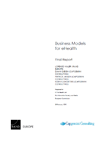
The first objective refers to the use of eHealth services and solutions to improve overall healthcare delivery. As argued in the opening stages of the report, these information technology (IT)-enhanced healthcare services can support healthcare delivery organisations and health authorities to provide responses to factors such as Europe's ageing population, the growing prominence of chronic diseases and financial challenges in controlling overall healthcare spending. The second objective refers to the fact that eHealth services and solutions can provide the appropriate responses previously indicated if industry delivers the appropriate technological solutions. Actually, as argued in the report, eHealth represents a substantial market where European industrial players can have a pivotal role.
Download Business Models for eHealth - Final Report (.pdf, 3.912 KB).
Download from eHealthNews.eu Portal's mirror: Business Models for eHealth - Final Report (.pdf, 3.912 KB).